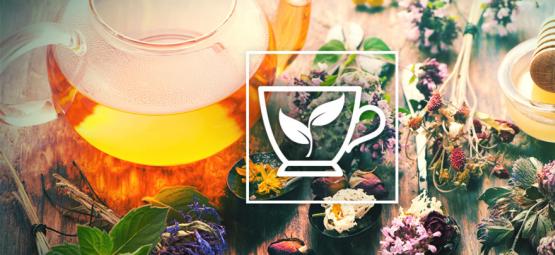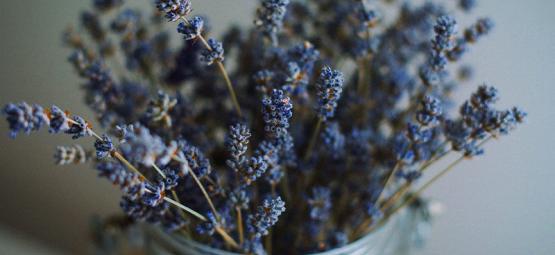Best Legal Herbs to Vaporize
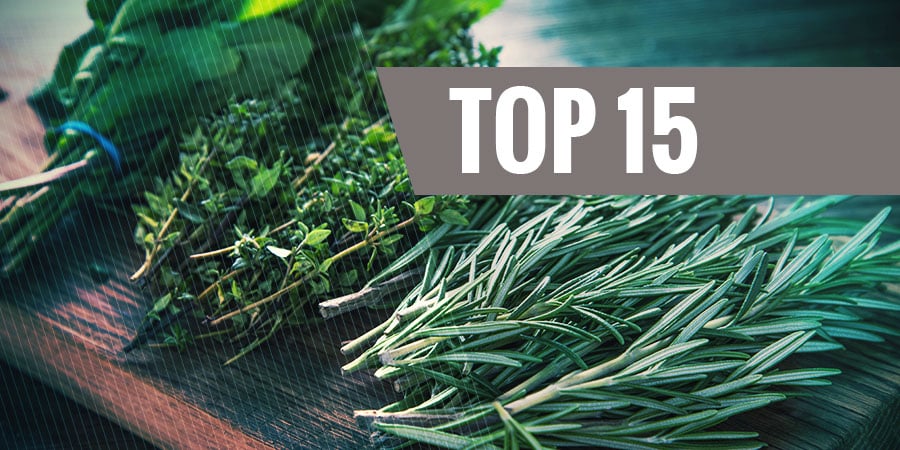
All of the following herbs are legal and can be vaped to your heart’s content! Many of them have long been used by herbal practitioners. Enjoy them alone or mix them in with your cannabis!
You can vape a whole range of herbs other than cannabis. And while you may not have purchased your vaporizer for aromatherapy purposes, there are a number of pleasant herbs worth checking out.
While there's nothing quite like cannabis, vaporizing legal herbs can be a delightful aromatic experience. Some of these herbs even have psychoactive effects, albeit on the mild side. These 15 herbs are completely legal and can be found in our shop!
1. Damiana: 190 °C / 374 °F
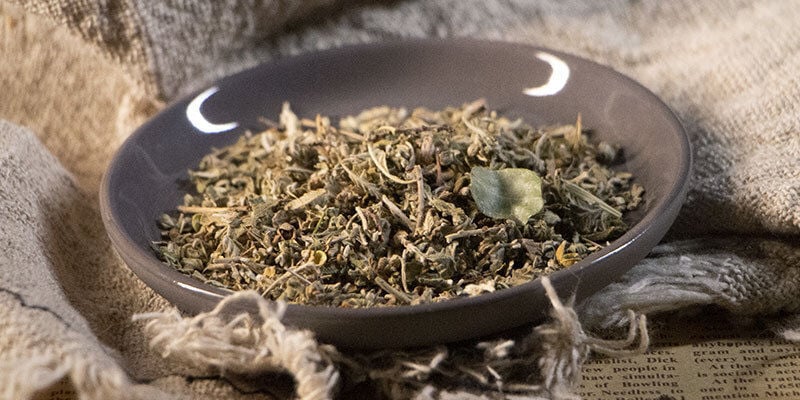
Turnera afrodisiaca
Damiana is a shrub native to Mexico that will impart a strong aromatic taste to your blend. Believed to be a major component of the original margarita recipe, the plant blooms beautiful yellow petals, but the leaves contain the active constituents damiana has become known for.
According to anecdotal reports, damiana induces a mild buzz, but nothing near that of cannabis. It is thought to act as an aphrodisiac and has been shown to increase sexual activity in both male and female rats. For centuries, damiana has been invoked in sexual scenarios by both men and women. You can also find a delicious damiana liqueur recipe on our blog.
2. Catnip: 150 °C / 302 °F
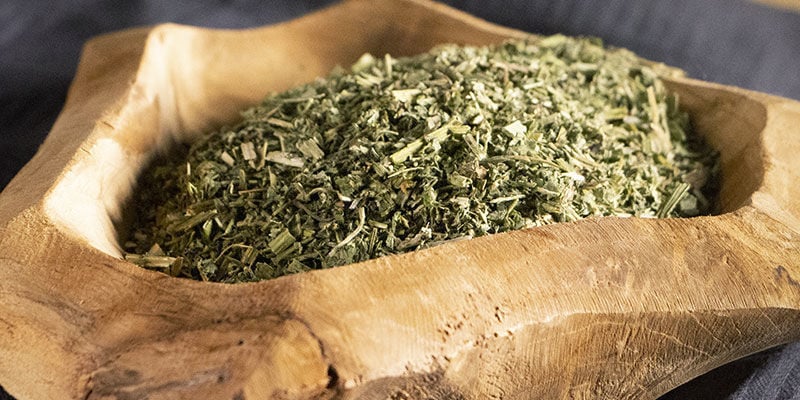 Nepeta Cataria
Nepeta CatariaCatnip is the herb that makes cats wail in pleasure. Unfortunately, it doesn’t do that to humans, but it’s still said to produce a relaxing and comfortable buzz that—when you vape some more—has a slight euphoric note to it. This is an herb for those very chill days.
As a member of the mint family, catnip develops dark green, serrated leaves and white flowers that can both be vaped or brewed into a tea to impart calming effects. Catnip is perfectly legal and sold fresh in most garden stores. Now you and your feline friend will have more in common!
3. Valerian: 200 °C / 392 °F
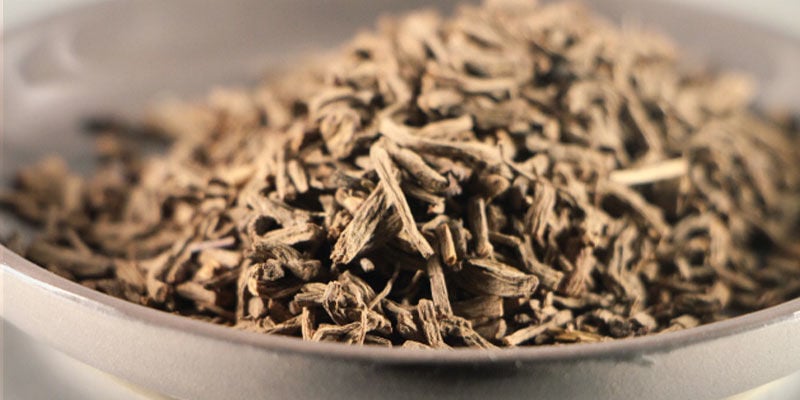 Valeriana Officinalis
Valeriana OfficinalisNative to Europe and Asia, valerian is a flowering plant that blooms pinkish-white flowers; however, it’s prized for the active constituents contained in its roots. Valerian has long been used for its sedating and calming properties—so long, in fact, that the herb was a popular feature in ancient Greece and Rome.
Vaporizing valerian is believed to induce much stronger effects than taking it in pill form or as a tincture. It mixes very well with lemon balm and other sedative herbs such as hops, passionflower, skullcap, etc.
4. Passion Flower: 140 °C / 284 °F
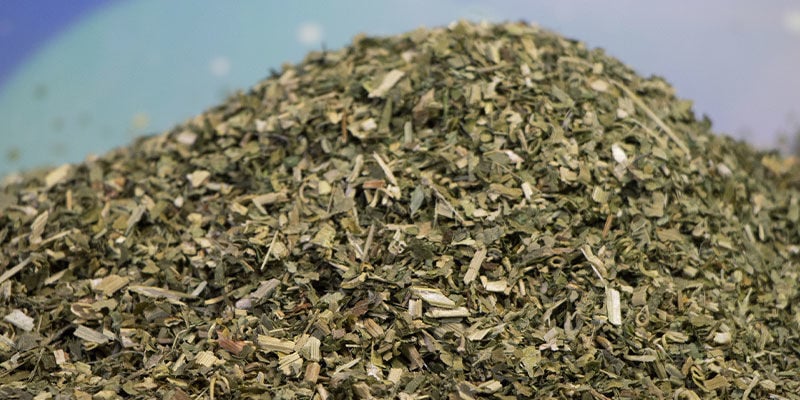 Passiflora Incarnata
Passiflora IncarnataPassionflower is a perennial vine that can be found growing naturally mainly in regions of Mexico, Central and South America. It blooms ornate purple-blue flowers and is highly prized for its sedative qualities. All of the above-ground parts of the plant can be utilised for this characteristic.
When vaporized, passionflower adds a relaxing and slightly tranquillising quality to the experience. Vape at low temperatures either by itself or mixed with other relaxing herbs if you want to kick back a bit in the evening.
5. Lavender: 130 °C / 266 °F
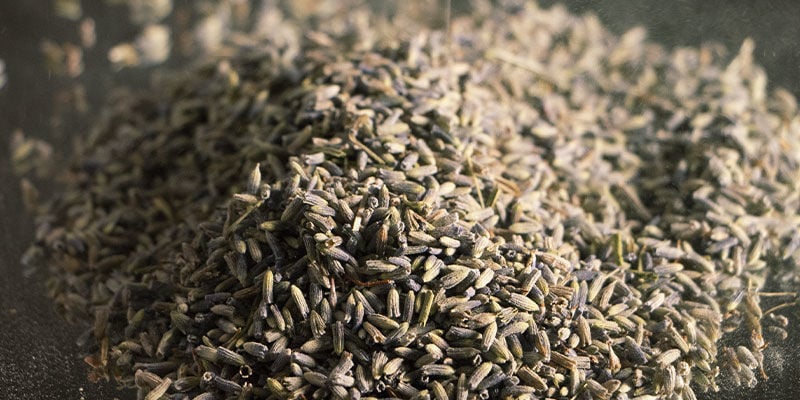 Lavandula Angustifolia
Lavandula AngustifoliaLavender is probably the most famous aromatic herb. It has a great taste and smell, boasts calming and relaxing properties, and is both antiseptic and antibacterial. Even if you are not interested in these properties, the aroma alone makes it a worthy addition to an herbal mix.
These flowering plants can be found around the world and are popularly used in culinary and meditative exploits for the relaxing scent of their flowers. In a vape mix, lavender immediately places the mind somewhere calm and serene.
6. Lemon Balm: 140 °C / 284 °F
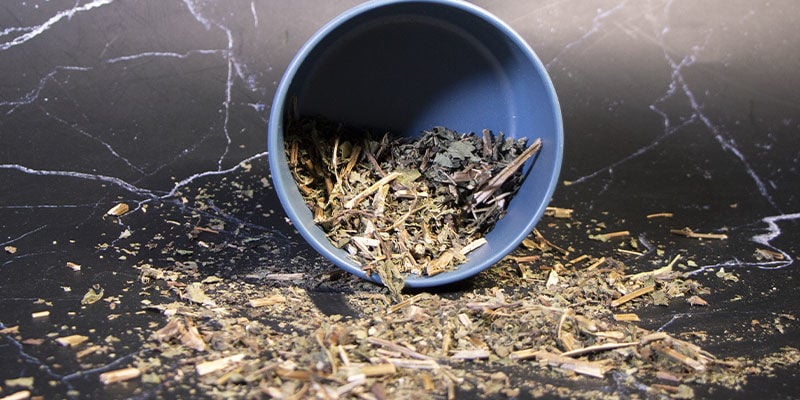 Melissa Officinalis
Melissa OfficinalisA member of the mint family, lemon balm is a pungent perennial plant native to parts of Europe and Asia. Among fans of aromatherapy, lemon balm is well-known for its great taste/smell and calming effects. Its clean, clear citrus aroma is invigorating but not overpowering.
Since lemon balm is said to have a relaxing effect, it is a good choice when looking to take it easy at the end of a long day. According to anecdotal reports, its calming nature is enhanced when mixed with other herbs such as hops, valerian, and chamomile.
7.Wild Lettuce: 140 °C / 284 °F
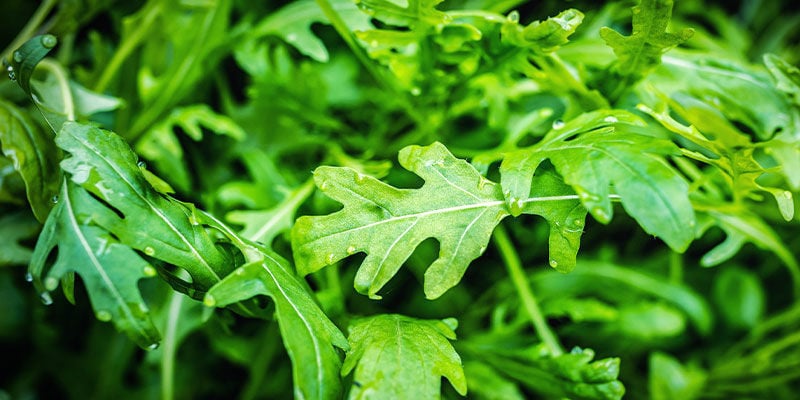 Lactuca virosa
Lactuca virosaWild lettuce, also known as opium lettuce, features mild sedating qualities. It is related to the common lettuce you put in your salad, but exhibits some interesting qualities. For one, secretions from the plant’s stem can be harnessed to create a type of latex.
As a vape herb, wild lettuce is great to de-stress with, and many users feel that it helps to shrug-off restlessness and excitability. It is also said to improve the vividness of your dreams. Mixed with cannabis, it can make for a milder and more relaxing effect.
8. Chamomile: 190 °C / 374 °F
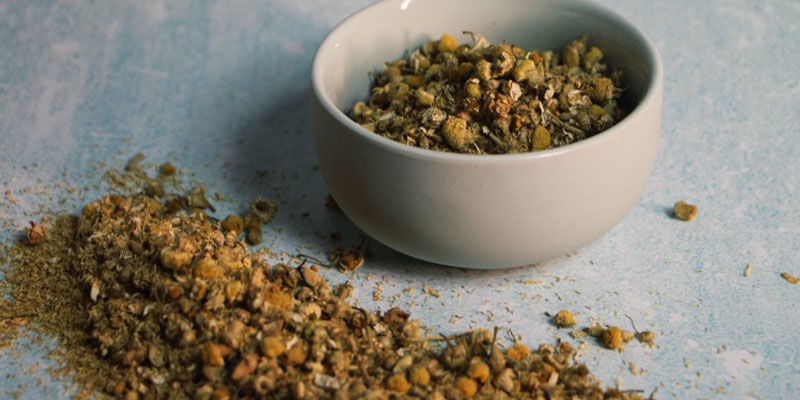 Matricaria Chamomilla
Matricaria ChamomillaGrowing wild across Europe and West Asia, chamomile generally describes two major species of flowering plant (Matricaria chamomilla and Chamaemelum nobile) in the Asteraceae family. Chamomile flower contains polyphenols and terpenoids believed to be mainly responsible for its calming effects.
Long invoked for its soothing properties, along with its fruity, floral taste, chamomile is an ever-popular feature in herbal teas. It can provide the same relaxing effect when vaped, but has a somewhat harsher taste. It is best enjoyed alongside other relaxing herbs like lemon balm or lavender.
9. Hops: 160 °C / 320 °F
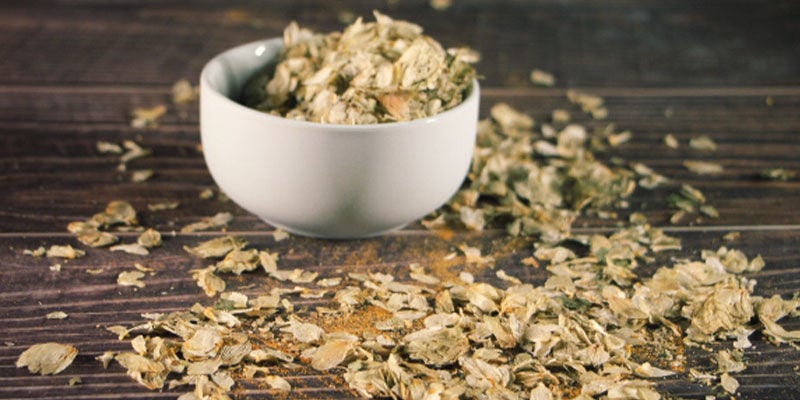 Humulus Lupulus
Humulus LupulusMost commonly associated with beer, hops are the terpene-rich flowers of the hop plant. These too can be a great addition to a vape blend, bringing unique flavours and effects to the table.
Many report that vaporizing hops induces a mildly euphoric and sedative effect, making it a good addition to a cannabis blend. The flavour is earthy, spicy, fruity, and sweet, courtesy of the terpenes myrcene, humulene, and caryophyllene. Some users add hops to all of their blends just for the taste it imparts.
10. GUNPOWDER GREEN TEA: 180 °C / 356 °F
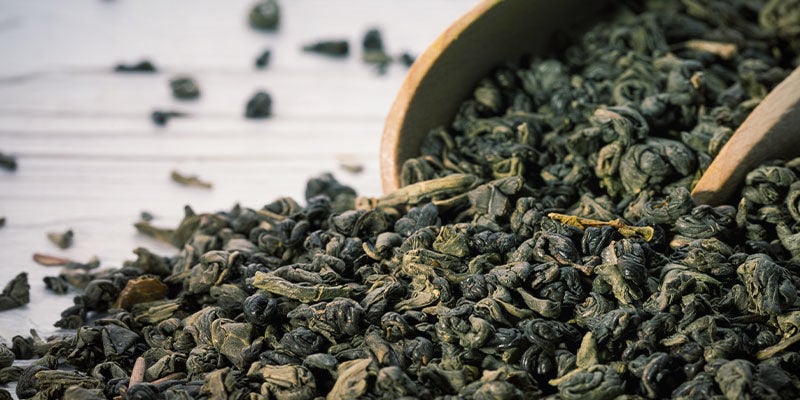 Camellia Sinensis
Camellia SinensisGunpowder green tea appears as numerous small pellets of tea, which have been rolled and prepared to unfurl when brewed. These pellets, resembling “gunpowder”, contain constituents that make them suitable for vaping.
Vaporizing gunpowder tea is said to cause a very stimulating buzz due to its caffeine content. If you want a more subtle, soothing experience, a slightly lower temperature should be used. The buzz gained by gunpowder tea is reported to be less than that of an equivalent cup of coffee, but the onset is much faster.
11. BLUE LOTUS: 110°C / 230°F
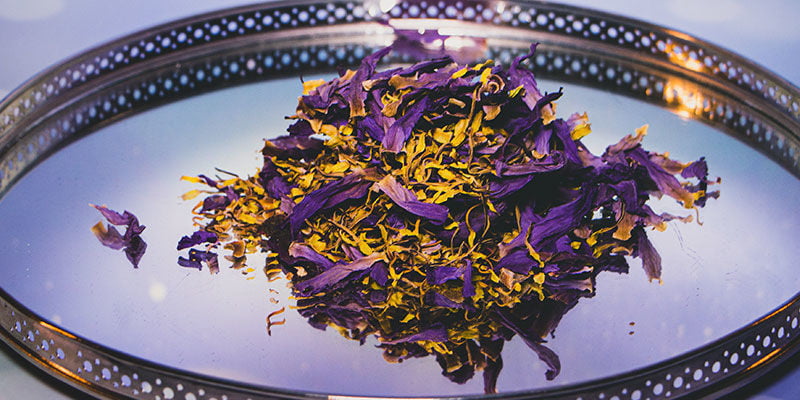 Nymphaea Caerulea
Nymphaea CaeruleaBlue lotus is a famous water lily that blooms whitish-blue to blue flowers. Containing the psychoactive alkaloid aporphine, blue lotus has long been used to induce different states of mind.
Blue lotus is first mentioned in the Egyptian Book of the Dead, as it was an important ceremonial plant in ancient Egypt. It has a mild stimulating and psychoactive effect that is dreamlike, euphoric, and relaxing. To enjoy vaping blue lotus, you need a vaporizer that can operate at a low temperature of 100–120°C. Not all vapes made for cannabis can go that low.
12. Yerba Mate: 150 °C / 302 °F
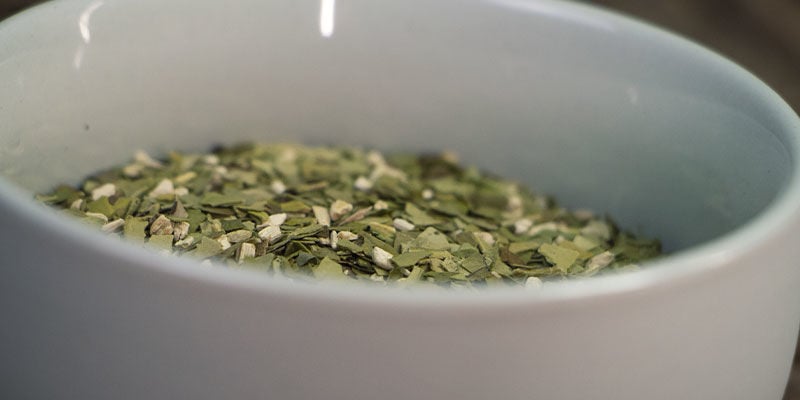
Enjoyed widely in the form of mate tea, yerba mate is an energising plant that begins as a shrub before bursting into a tall tree. Featuring green-white flowers and red fruits, the dry leaves and stems are most commonly used in mate preparation.
Much like green tea, it can be used by itself or as part of a stimulating mix to induce a pleasant and energising buzz. This is mostly thanks to caffeine, but also to theobromine and theophylline (found in chocolate). Read more about the botanical brother of yerba mate, Guayasa.
13. Calea Zacatechichi: 190 °C / 374 °F
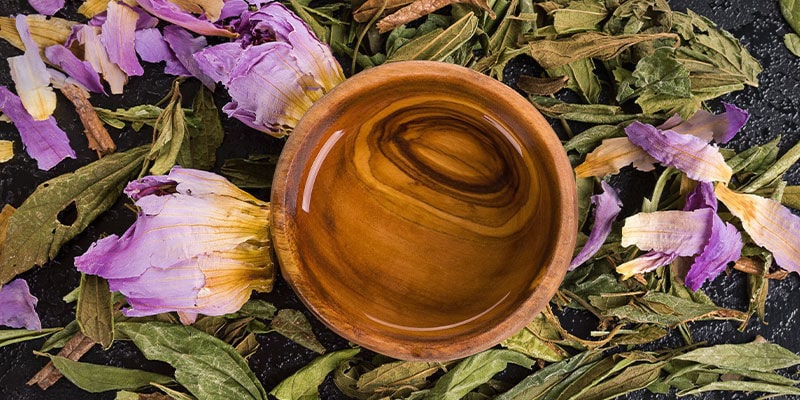 Calea Ternifolia
Calea TernifoliaKnown as the “dream herb”, Calea zacatechichi is a flowering plant native to Mexico and Central America. Used traditionally to induce and enhance lucid dreams, its effect has been described as a very sedating and slightly hallucinogenic experience when vaporized.
Calea zacatechichi has the potential to help you drift off to sleep and explore your dreams. Known to have a bitter flavour, this herb is perhaps best enjoyed alongside other, more flavourful herbs like lemon balm or hops.
14. Peppermint: 160 °C / 320 °F
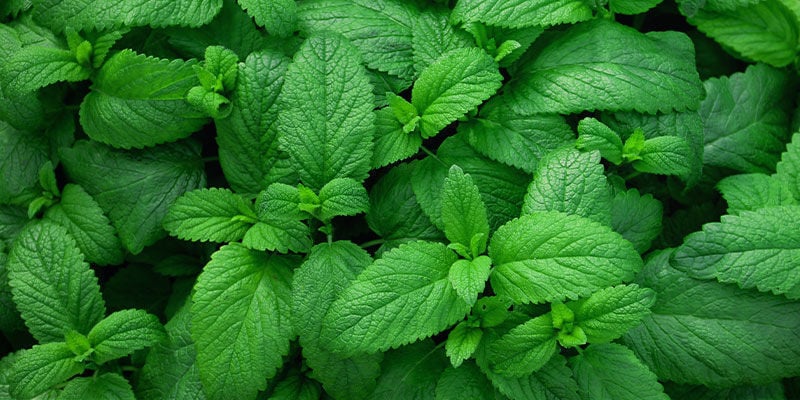
A cross between water mint and spearmint, peppermint can be found growing pretty much everywhere in Europe. It is distinguished by its unique minty taste and is popularly used to brew a relaxing herbal tea. It can also be a good addition to a vape mix as it is said to help soothe tension.
In aromatherapy, the minty flavour of peppermint is thought to promote a clear, refreshed, and focused mind. This is mainly down to the chemical constituents menthol and menthone, as well as terpenes like limonene, beta-pinene, and beta-caryophyllene. Peppermint also displays antiseptic properties.
15. Thyme: 190 °C / 374 °F
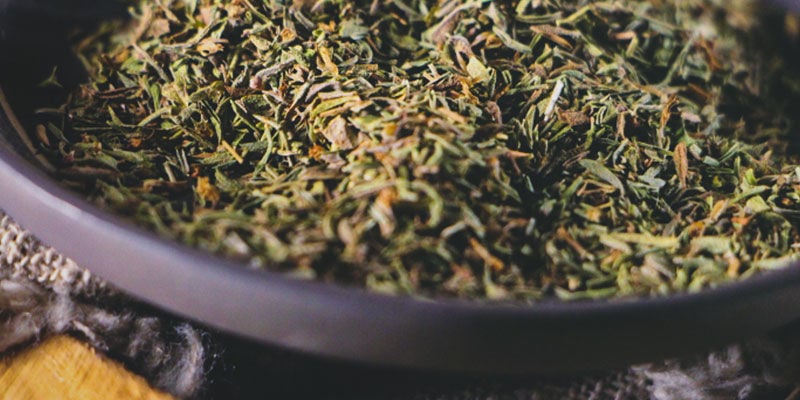
Essential oil of thyme features widely in cosmetic and dental products for its fresh, invigorating aroma and flavour. Also a common culinary herb, thyme has a great taste that is said to complement cannabis in a vape blend.
Thyme does create a subtle buzz of its own, courtesy of the terpene myrcene. This aromatic substance is also found in cannabis. In fact, we heard that in combination with cannabis, thyme can help you save bud as it augments its effect. You’ll have to see for yourself if it’s true!
- Francesca Borrelli, & Angelo A. Izzo. (2009, December). Herb–Drug Interactions with St John’s Wort (Hypericum perforatum): an Update on Clinical Observations - https://www.ncbi.nlm.nih.gov
- Peir Hossein Koulivand, Maryam Khaleghi Ghadiri, & Ali Gorji. (2013). Lavender and the Nervous System - https://www.ncbi.nlm.nih.gov
You might also like












 United States
United States





